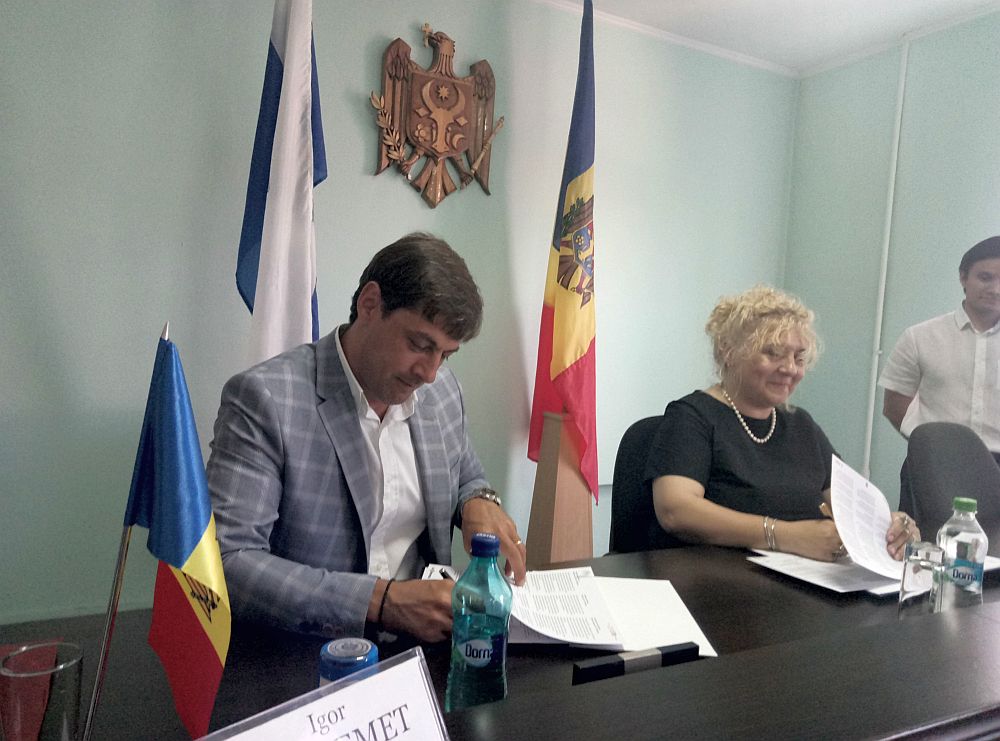On June 29th, 2017, in Balti, Moldova, the Vice Mayor of Balti Igor Sheremet and Executive Director of the Stop TB Partnership Dr. Lucica Ditiu signed the ‘Declaration of Interest: Alignment with the Zero TB Initiative’. Balti becomes the second city in the region of Eastern Europe and Central Asia joining the initiative after Odesa joined it on May 30th, 2017.
‘Signing Zero TB Declaration is of great importance for the Balti municipality taking into account extremely high TB burden, and success of the TB response depends first of all on the efforts of all stakeholders. Here the role of local authorities is paramount both in terms of implementation of the municipal TB Program and in terms of support of civil society associations. I consider that signing this Declaration provides for the extended involvement of the local administration in the TB response and opens possibilities to engage international expertise. I would like to express my gratitude to all the parties who contributed to achieving this result.’ – pointed out Vice Mayor, Igor Sheremet.
Along with other Eastern European countries Republic of Moldova faces high burden of Tuberculosis. Although TB rates are gradually declining for the past decade, the situation is still challenging. According to WHO in 2015 Moldova had more than 4 000 new TB cases. About 32% of new TB patients are multidrug resistant and 9% of them have TB/HIV co-infection. The number of TB/HIV cases is continually growing and reached 13 per 100 000 in 2015.
TB burden in Balti is much higher comparing to the general country situation. In 2015 TB notification rate in Balti and in Moldova was 103,7 and 88,7 per 100 000 population accordingly. In 2015 Balti had 152 new TB cases. Every 3 days 1 person develops new TB disease and every fourth TB patient has HIV in Balti. TB mortality rates in Balti are about 45% higher than countrywide for past several years. TB/HIV incidence is also higher in Balti than in Moldova in general (25,3 vs. 13 per 100 000 in 2015) as well as TB/HIV mortality (11,3 vs.4,5 per 100 000 in 2015).
The Declaration was initiated within the Fast Track TB/HIV responses for key populations in EECA cities project operating in 5 cities of EECA region. Operational research that will start in mid-2017 as a part of the project will focus on strengthening linkages between TB and HIV programs to reduce HIV/TB mortality in the city of Balti.
‘I am pleased to see the increasing role of cities in EECA region in response to TB epidemic. I am very happy that Balti is joining the initiative today,’ stated Dr. Lucica Ditiu, Executive Director, Stop TB Partnership.
Sergey Filippovych, Director: Treatment, Procurement & Supply Management, Alliance for Public Health said: ‘Patient-centered approaches stipulate not only integrated medical care but also necessary social and psychological support. Such comprehensive support significantly increases the treatment success rates. Our experience shows that using these approaches increase treatment success rate in patients with multidrug-resistant tuberculosis to 86%. It is two times more than the average rate in EECA.’
Background information
The Zero TB Cities project, a collaborative initiative geared towards significant, accelerated reductions in tuberculosis mortality and prevalence in high-burden metropolitan areas. To date, Odesa, Ukraine; Chennai, India; Durban, South Africa; Karachi, Pakistan; Kisumu, Kenya; and Lima (Caraballyo), Peru have moved swiftly to design comprehensive programs, create new partnership models, and begin resource mobilization for this effort.
Fast-track HIV/TB responses among key populations in cities of Eastern Europe and Central Asia is the Global Fund funded EECA regional project of Alliance for Public Health (Ukraine), AFEW International (The Netherlands), licit (Switzerland) and Stop TB Partnership under technical guidance of UNAIDS EECA office which is there to support city responses to HIV and TB in key populations in the five cities of EECA, including Balti. The project will be implemented throughout 2017-2019 and plans to develop efficient and sustainable city models of HIV/TB responses that would allow to reduce AIDS and TB mortalities in the project cities as well as increase the allocation of city funding to HIV/TB interventions for key populations.
The Stop TB Partnership is leading the way to a world without tuberculosis (TB), a disease that is curable but still kills three people every minute. Founded in 2001, the Partnership’s mission is to serve every person who is vulnerable to TB and ensure that high-quality diagnosis, treatment and care is available to all who need it. Together our 1500 partners are a collective force that is transforming the fight against TB in more than 100 countries. They include international and technical organizations, government programs, research and funding agencies, foundations, NGOs, civil society and community groups and the private sector.
Alliance for Public Health is a leading non-governmental professional organization established in 2000 making a significant impact on the epidemics of HIV/AIDS, tuberculosis, viral hepatitis and other socially dangerous diseases in Ukraine and providing support on responses globally.
TB in Eastern Europe and Central Asia Project on Strengthening Health Systems for Effective TB and DR-TB Control funded by the Global Fund is there to decrease the burden of tuberculosis disease and halt the spread of drug resistance in target EECA countries through increasing political commitment and translating evidence into implementation of patient-centered TB models of care. The Principal Recipient of the Global Fund grant is PAS Center (Moldova). Alliance for Public Health is an implementing partner of the project on behalf of TB Europe Coalition, responsible for the civil society advocacy in support of the people-centered TB care in the region of Eastern Europe and Central Asia.

